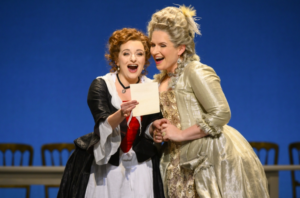Sotto ai pini del boschetto.... sex & desire in Mozart's "Le nozze di Figaro"

CANZONETTA SULL’ARIA…
Contessa: Che soave Zeffiretto, questa sera spirera’, sotto i pini del boschetto…. Ei gia’ il resto capira’!
Susanna: Certo, certo il capira’
But who tells to a lot of beautiful ladies who are singing this amazing Duet from the Opera “Le Nozze di Figaro“, what are they really singing? Most of them they cannot really understand the true meaning… since it’s not easy to deal with the omnipresent double sense of the italian style and language.
Who knows if they understand the subtle malice of our very Italian Mr Lorenzo Da Ponte, and his sidekick Mr Wolfgang Amadeus Mozart, well versed in malice and double meanings?
Oooh, but how this is possible? Such sweet, celestial, heavenly music, how it can allow such a text full of double sexual meanings…
But, please, who are we talking about? Who is this strange composer who can do such strange things?
This is why Mozart was unique, and we call him a genious!
A big power of vital energy enclosed in celestial music, where there is no separation between the celestial container and the profane content, because matter and spirit are united together in humans, and an Aquarius like Mozart knew this very well.
“Che soave Zeffiretto”… Zephyr is the Spring Wind that fertilizes and brings inspiration and stimulation to mating.
“Sotto ai pini del boschetto”: in Italian “il boschetto” is a typical allusion to the female genital organ, namely the vagina.
This duet is a cunning collaboration between two brilliant women, of two different ages, who are about to take by the throat with a tremendous trap the Count of Almaviva (his name means “alive soul”) who is losing himself in the vanity of sex, to recall him to the presence, to the true meaning of his name.
The Countess, the mature woman who has reached adulthood in which she has finally understood something about the vanity of the senses, desire and passions, and Susanna, the young bride who is very intelligent and is therefore initiated by the Countess to become a Woman.
And the experience for the Count, in the trap set by the two women, will be fatal: the initiation for him as a Man will be completed, too: he will in fact begin to praise the hands of his own wife as “precious little hands”, convinced that they are those of his lover (in reality she is his wife in disguise). We know that sometimes man need more time to understand things…. and Lorenzo Da Ponte has given us a very good example.
And finally, finally… the Don Giovanni that Conte d’Almaviva has become will learn the lesson, and will be able to ask for forgiveness from the heart! And of course, the Countess will forgive him, because she has already forgiven him, because “Cosi’ fan tutte and Cosi’ fan tutti”, and we are here to welcome each other and understand that we are truly all equal, especially in our fragilities.
So be careful, because Don Giovanni can posses us in any moment of our lives! Not only when we are young and full of desire and passion, but also after that we fall in love so deeply (or we just think we are falling in love, but Love is something else that we really do not know yet) for a smart and sweet woman like the young Contessa Rosina used to be (please, watch the Barbiere di Siviglia for the story of their enagagement). After some years that we have a stable relationship, our mind (ego) get tired and we don’t see anymore the precious beauty in front of us. How miserable is the human condition. And this is not only for men, of course! We want more, we want more…
That’s the amazing lesson of life and education to Love that Opera was able to give to the public, but yes, now we prefer to have entratainment…
This is wisdom, and in this specific case it comes from women, who often can reach it first, so that they can inspire men to direct their energies (not only the sexual one) toward the Good.
Giulia Maria Miscioscia

